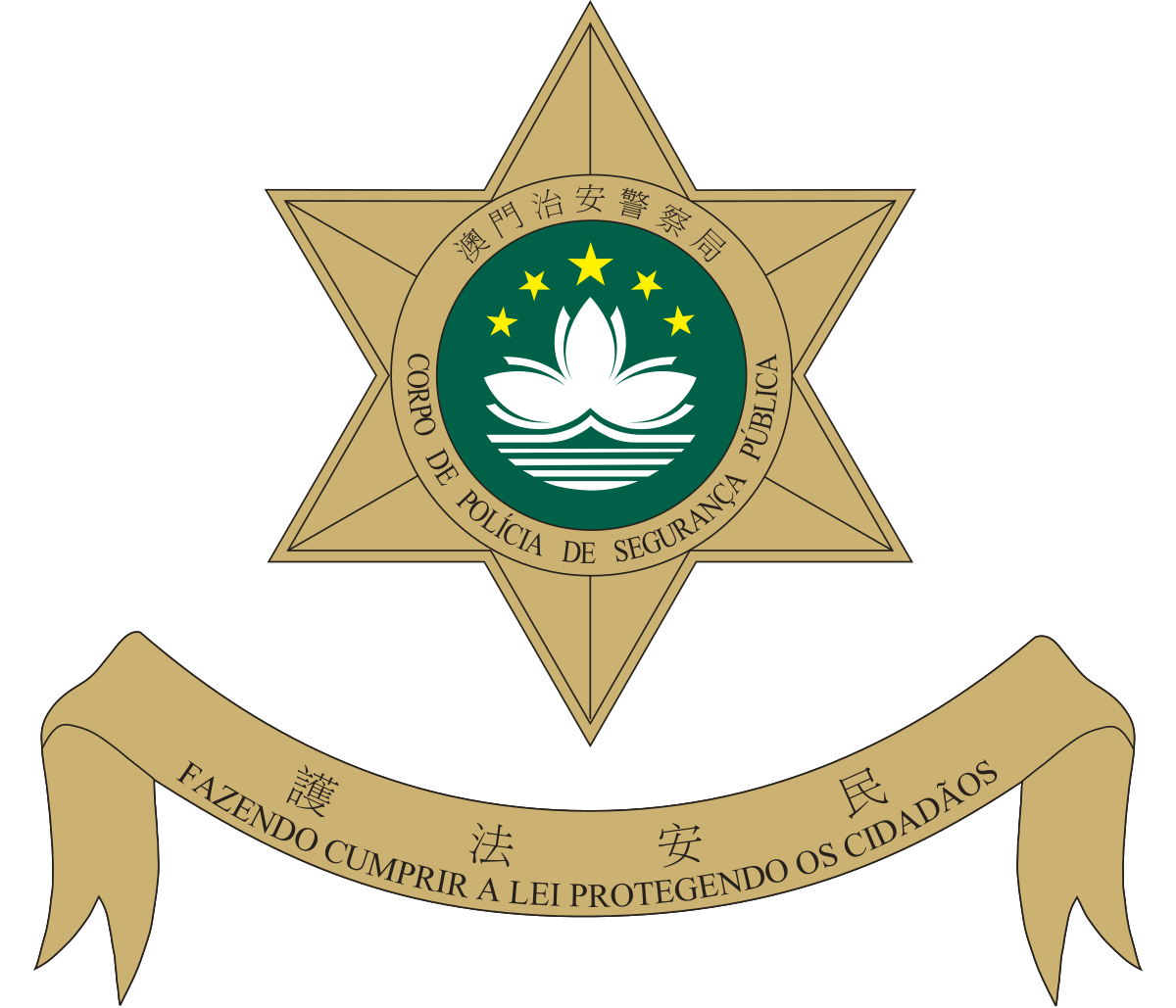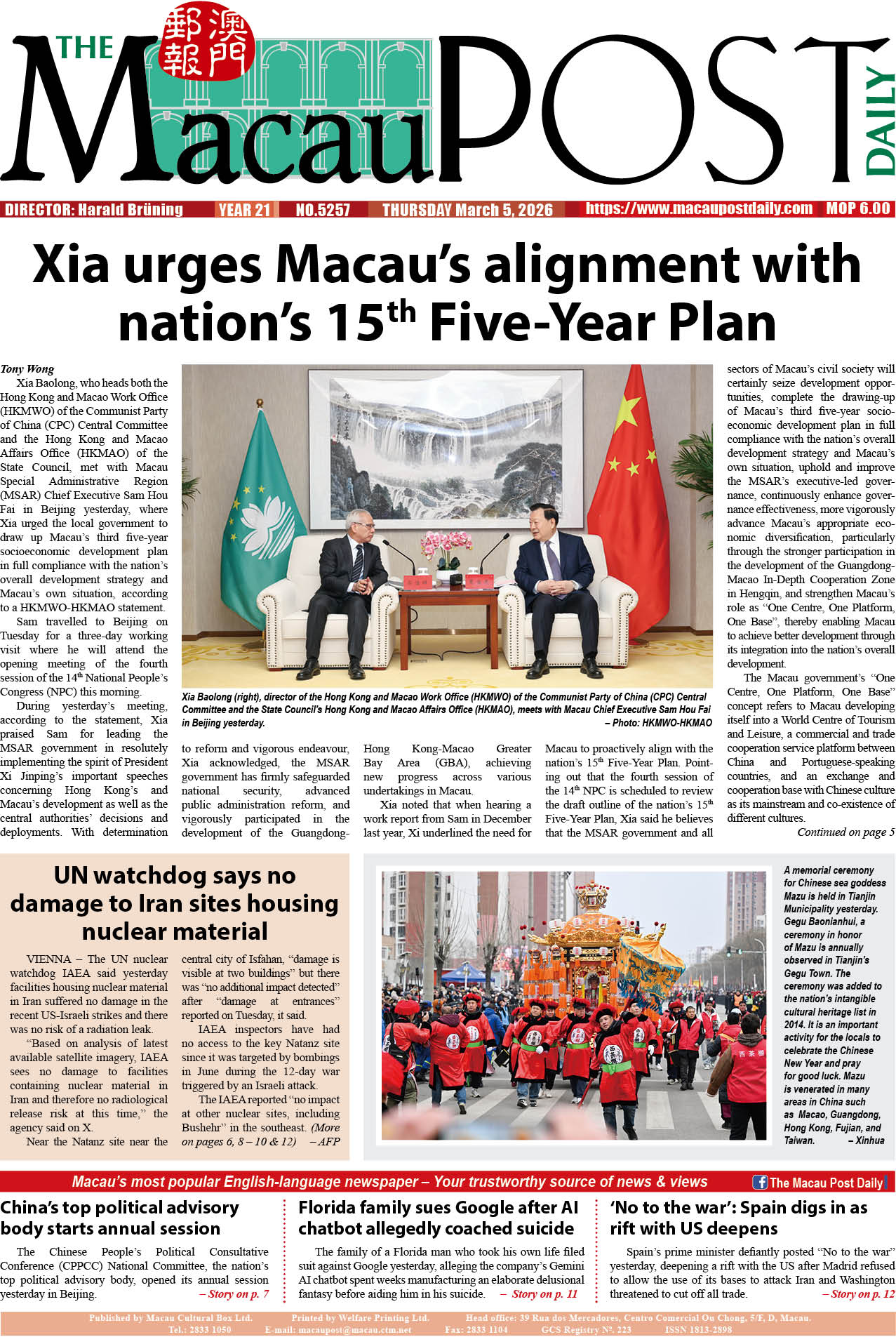Full implementation of ‘One Country, Two Systems’ & Basic Law is ‘fundamental prerequisite’ for Macau-related int'l legal cooperation: FM senior official Jia Guide
The full and faithful implementation of the policy of “One Country, Two Systems” and the Macau Basic Law is the fundamental prerequisites for Macau-related international legal cooperation, Jia Guide, director-general of the Treaty and Law Department of the Ministry of Foreign Affairs in Beijing, said at a symposium in Macau yesterday.
The symposium at MGM in Nape was hosted by the Ministry of Foreign Affairs and the local government. It marked the 20th anniversary of Macau’s return to the motherland. Chief Executive Fernando Chui Sai On and Commissioner of the Ministry of Foreign Affairs in Macau Shen Beili attended the symposium and delivered opening remarks. About 400 guests including Macau’s first chief executive Edmund Ho Hau Wah, vice-chairman of the National Committee of the Chinese People’s Political Consultative Conference, and Hong Kong’s Secretary of Justice Teresa Cheng Yeuk-wa attended the one-day symposium, which was addressed by a number of senior mainland and local government officials and scholars.
Chui stresses core value of loving the motherland & Macau
Macau’s chief executive acknowledged in his opening remarks Macau’s great success in implementing the “One Country, Two Systems” since its return to the motherland. He thanked the central government’s support of the Macau Special Administrative Region (MSAR) in expanding international exchanges and cooperation, and promoting Macau-related foreign legal affairs. He stressed the full and faithful implementation of the policy of “One Country, Two Systems”, and the core value of loving the motherland and loving Macau. He also emphasised the important role of the MSAR in the nation’s reform and opening-up process and major-country diplomacy with Chinese characteristics in the new era, and the increasing importance of the Macau-related foreign affairs and international legal cooperation in this regard.
Commissioner Shen spoke highly of the achievement of the Macau-related foreign legal affairs over the past 20 years for effectively safeguarding national sovereignty, security and interests and the long-term prosperity and stability of MSAR. She emphasised that the recent fourth plenary session of the 19th CPC Central Committee made important decisions for upholding and improving the institutional systems for the policy of “One Country, Two Systems”, which pointed out the direction of future work of the Macau-related foreign legal affairs.
Shen’s 4 suggestions
Shen proposed main suggestions in this regard, namely to fully respect and comply with the Constitution and the Basic Law; keep improving mechanisms that facilitate the full implementation of the Constitution and the Basic Law; actively serve the social and economic development of the MSAR; and promote legal and institutional innovation which serves better the policy of “One Country, Two Systems”.
Written interview with Director-General Jia
In a written interview, Director-General Jia pointed out that the symposium summarised the practice and experience of Macau-related foreign legal affairs during the past 20 years, and explored ways to further improve Macau-related foreign legal affairs in the future. The symposium demonstrated the successful implementation of the policy of “One Country, Two Systems” in the MSAR and facilitated communication and exchanges among legal practitioners from mainland China and the Hong Kong and Macau SARs. This will further promote the implementation of the “One Country, Two Systems” policy in a stable and far-reaching manner.
I. Practice and progress in Macau-related foreign legal affairs
Since the return of Macau to the motherland, the central government has fully implemented the policies of “One Country, Two Systems,” “the people of Hong Kong governing Hong Kong,” “the people of Macau governing Macau,” and a high degree of autonomy for both SARs. All Macau-related foreign legal affairs have been conducted in strict accordance with the nation’s Constitution and the Macau Basic Law, with guidance and assistance from the central government in establishing a network for international legal cooperation.
A. Application and implementation of international conventions to the MSAR
Before 1999, the central government took diplomatic and legal measures for the application of 158 international conventions to the MSAR. Since Macau’s return to the motherland in 1999, the central government has asked the MSAR about the applicability of nearly 600 international conventions related to Macau, among which over 400 have been applied to the MSAR. The central government also attaches great importance and provides assistance to the MSAR in its implementation of conventions.
B. Authorising and assisting the MSAR in signing bilateral agreements.
The MSAR has signed with different countries and regions two bilateral investment agreements, 12 agreements on civil aviation and 5 amendments thereof, 16 agreements on exchange of tax information and two MOUs thereof, four agreements on avoidance of double taxation and one protocol for amendments thereof, as well as 10 agreements on judicial assistance .
C. Authorising and assisting the MSAR in international judicial and law enforcement cooperation.
For international conventions, through various arrangements made by the central government, several key conventions such as the United Nations Convention against Corruption and the United Nations Convention against Transnational Organised Crime have been applied to the MSAR. For bilateral agreements, the central government has authorised the MSAR to negotiate 32 agreements on judicial assistance and 10 of them were signed.
D. Guiding and assisting the MSAR in participating in international organisations and conferences.
With the support of the central Government, the number of international organisations the MSAR has joined has increased from 51 to 120 since 1999. Officials of the MSAR have participated around 300 times in international conferences or other events as members of delegations of the People’s Republic of China (PRC). The MSAR has also participated more than 1,500 times in international conferences under the name of “Macao, China”, and has hosted over 80 various international conferences and activities.
E. Providing international law capacity-building to MSAR.
Since 2003, the Ministry of Foreign Affairs(MFA)has implemented 20 rounds of training programmes on international law for more than 1,100 civil servants from the MSAR. Since 2012, the MFA has co-hosted with universities in Macau eight on-campus rounds of the International Law Lectures, and experts from MFA and scholars from mainland were invited to give lectures on hot-button topics of international law.
II. Experience and Inspiration from the past 20 years
With 20 years of practice and exploration in guiding and assisting the MSAR government in international legal cooperation, we can draw the following important experience and inspiration:
A. The full and faithful implementation of the policy of “One Country, Two Systems” and the Macau Basic Law is a fundamental prerequisite for Macau-related international legal cooperation. To establish an international legal cooperation network, we must fully and precisely understand the essence of “One Country, Two Systems” policy and the Macau Basic Law. We should deal with complicated legal issues with the larger interests in mind, so as to safeguard our national sovereignty, security and development interests as well as the long-term stability and prosperity of Macau.
B. Providing tailored solutions to meet the needs of the MSAR is the basic approach. The central government has focused on solving problems and meeting the needs of the MSAR and provided tailored legal and treaty solutions. For example, by enhancing mutual trust between the MSAR government and relevant foreign governments in judicial and enforcement cooperation, we have successfully promoted the solution to the issue of unlawful and criminal activities by some foreign nationals.
C. Continuous innovation in mechanisms and institutions is an important guarantee. Since 2004, the Department of Treaty and Law of the MFA and the Secretariat for Administration and Justice of the MSAR government have established annual consultation mechanism for Macau-related foreign legal affairs.
III. Outlook
The 4th plenary session of the 19th CPC Central Committee emphasises that the policy of “One Country, Two Systems” is a great innovation under Socialism with Chinese Characteristics and an important institutional policy for achieving the nation’s peaceful reunification. It also stresses that the Hong Kong and Macau SARs should be governed in full consistence with the nation’s Constitution and the respective Basic Laws, so as to maintain their long-term prosperity and stability, while legislation and enforcement mechanisms for the two SARs to safeguard national security shall be set up and improved.
Guided by Communist Party of China (CPC) General Secretary XI Jinping’s important remarks on Hong Kong and Macau and the spirit of the 4th plenary session of the 19th CPC Central Committee, we shall promote our work in Macau-related foreign legal affairs and help the MSAR to improve its international legal cooperation network.
A. We shall continue to give steadfast support to the MSAR for promoting its international cooperation, with a view to make more contributions to the cause of major country diplomacy with Chinese characteristics. We shall plan and coordinate Macau-related foreign affairs under the nation’s general diplomacy framework, expand and improve Macau’s international legal cooperation network, so as to enhance Macau’s role and function in the nation’s opening-up process
B. We shall keep clear awareness of potential risks, prevent and eliminate external disturbances. With the increasingly intense international competition, the policy of “One Country, Two Systems” is faced with more complicated and severe external circumstances and risks. We shall carry forward the Macau spirit of loving the country and loving Macau, and keep vigilant about foreign forces that intend to create disturbances and disruptions under the pretext of the law, so as to fulfil the constitutional responsibility of safeguarding national sovereignty, security and development interests, and safeguard the long-term prosperity and stability of Macao SAR.
C. We shall enhance research and innovations on the improvement of the mechanisms and institutions for the full implementation of the Basic Law. With the further enriching and expanding of Macau-related foreign legal affairs, we should work to ensure that the central government exercises its overall jurisdiction over Macau and explore better ways to fulfil the rights and obligations as mandated by the nation’s Constitution and the Macau Basic Law. We should also further study those un-activated provisions of the Basic Law on external affairs so as to explore new practices of the implementation of the policy of “One Country, Two Systems”. Meanwhile, we shall continue to tell Macau’s story well, so that the international community will fully recognise the innovative practice of international law in the practice of “One Country, Two Systems” without any misunderstanding or distortion.
Jia Guide, director-general of the Department of Treaty and Law of the Foreign Ministry (front, fourth from left), National Committee of the Chinese People’s Political Consultative Conference (CPPCC) Vice-Chairman Edmund Ho Hau Wah (front, fifth from left), Chief Executive Fernando Chui Sai On (front, sixth from left), Foreign Ministry Commissioner Shen Beili (front, fifth from right) and other senior officials from the mainland, Macau and Hong Kong pose for a group photo during yesterday’s opening ceremony of a symposium and photography exhibition on Macau’s external legal affairs in commemoration of the 20th anniversary of Macau’s return to the motherland. Photo: GCS








